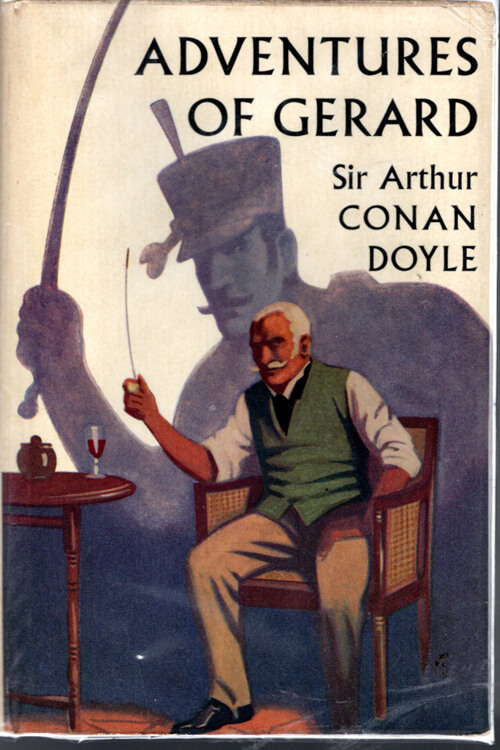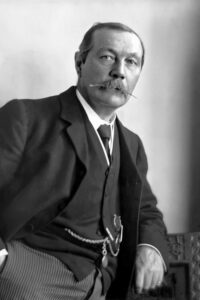
The Adventures of Gerard
Hussars of Conflans were in front of the cavalry, and I was in front of the Hussars. But of all the cities we visited, Venice is the most ill-built and ridiculous. I cannot imagine how the people who laid it out thought that the cavalry could maneuver. It would puzzle Murat or Lassalle to bring a squadron into that square of theirs. For this reason, we left Kellermann’s heavy brigade and also my Hussars at Padua on the mainland. But Suchet with the infantry held the town, and he had chosen me as his aide-de-camp for that winter because he was pleased about the affair of the Italian fencing master at Milan. The fellow was a good swordsman, and it was fortunate for the credit of French arms that it was I who was opposed to him. Besides, he deserved a lesson, for if one does not like a prima donna’s singing one can always be silent, but it is intolerable that a public affront should be put upon a pretty woman. So the sympathy was all with me, and after the affair had blown over and the man’s widow had been pensioned Suchet chose me as his galloper, and I followed him to Venice, where I had the strange adventure which I am about to tell you.
You have not been to Venice? No, for it is seldom that the French travel. We were great travelers in those days. From Moscow to Cairo we had traveled everywhere, but we went in larger parties than were convenient to those whom we visited, and we carried our passports in our limbers. It will be a bad day for Europe when the French start traveling again, for they are slow to leave their homes, but when they have done so no one can say how far they will go if they have a guide like our little man to point out the way. But the great days are gone and the great men are dead, and here am I, the last of them, drinking wine of Suresnes and telling old tales in a cafe.
But it is of Venice that I would speak. The folk there live like water rats upon a mud bank, but the houses are very fine, and the churches, especially that of St. Mark, are as great as any I have seen. But above all, they are proud of their statues and their pictures, which are the most famous in Europe. Many soldiers think that because one’s trade is to make war one should never have a thought above fighting and plunder. There was old Bouvet, for example—the one who was killed by the Prussians on the day that I won the Emperor’s medal; if you took him away from the camp and the canteen, and spoke to him of books or art, he would sit and stare at you. But the highest soldier is a man like myself who can understand the things of the mind and the soul. It is true that I was very young when I joined the army, and that the quartermaster was my only teacher, but if you go about the world with your eyes open you cannot help learning a great deal.
Read or download Book
Arthur Conan Doyle
Sir Arthur Ignatius Conan Doyle KStJ, DL (22 May 1859 – 7 July 1930) was a British writer and physician. He created the character Sherlock Holmes in 1887 for A Study in Scarlet, the first of four novels and fifty-six short stories about Holmes and Dr. Watson. The Sherlock Holmes stories are milestones in the field of crime fiction.
Doyle was a prolific writer; other than Holmes’s stories, his works include fantasy and science fiction stories about Professor Challenger, and humorous stories about the Napoleonic soldier Brigadier Gerard, as well as plays, romances, poetry, non-fiction, and historical novels. One of Doyle’s early short stories, “J. Habakuk Jephson’s Statement” (1884), helped to popularise the mystery of the Mary Celeste.
Name
Doyle is often referred to as “Sir Arthur Conan Doyle” or “Conan Doyle”, implying that “Conan” is part of a compound surname rather than a middle name. His baptism entry in the register of St Mary’s Cathedral, Edinburgh, gives “Arthur Ignatius Conan” as his given name and “Doyle” as his surname. It also names Michael Conan as his godfather. The catalogs of the British Library and the Library of Congress treat “Doyle” alone as his surname.
Steven Doyle, publisher of The Baker Street Journal, wrote: “Conan was Arthur’s middle name. Shortly after he graduated from high school he began using Conan as a sort of surname. But technically his last name is simply ‘Doyle’.” When knighted, he was gazetted as Doyle, not under the compound Conan Doyle.
Doyle’s first novels were The Mystery of Cloomber, not published until 1888, and The Unfinished Narrative of John Smith, published only posthumously, in 2011. He amassed a portfolio of short stories, including “The Captain of the Pole-Star” and “J. Habakuk Jephson’s Statement”, both inspired by Doyle’s time at sea. The latter popularised the mystery of the Mary Celeste and added fictional details such as that the ship was found in perfect condition (it had taken on the water by the time it was discovered), and that its boats remained on board (the single boat was missing). These fictional details have come to dominate popular accounts of the incident, and Doyle’s alternative spelling of the ship’s name as the Marie Celeste has become more commonly used than the original spelling.
Between 1888 and 1906, Doyle wrote seven historical novels, which he and many critics regarded as his best work. He also wrote nine other novels, and—later in his career (1912–29)—five narratives (two of novel length) featuring the irascible scientist Professor Challenger. The Challenger stories include his best-known work after the Holmes oeuvre, The Lost World. His historical novels include The White Company and its prequel Sir Nigel, set in the Middle Ages. He was a prolific author of short stories, including two collections set in Napoleonic times and featuring the French character Brigadier Gerard.
Doyle’s works for the stage include Waterloo, which centers on the reminiscences of an English veteran of the Napoleonic Wars and features a character Gregory Brewster, written for Henry Irving; The House of Temperley, the plot of which reflects his abiding interest in boxing; The Speckled Band, adapted from his earlier short story “The Adventure of the Speckled Band”; and an 1893 collaboration with J. M. Barrie on the libretto of Jane Annie.






